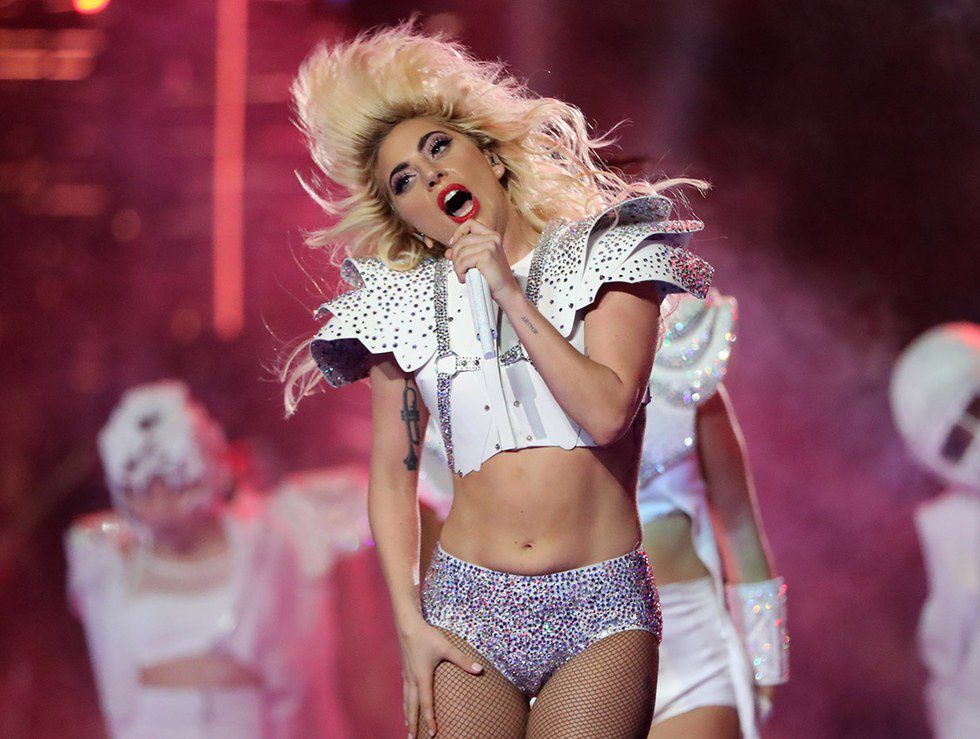Another day, another celebrity is brought into the light for being body-shamed.
Recommended for you
The internet has become the hotbed of low-life trolls that choose to spend their time picking on others for their entertainment.
A few nights ago, after her Super Bowl performance, Lady Gaga became the newest celebrity to join the list of unfortunate incidents of body shaming.
Gaga smashed her half-time Super Bowl performance on the night. Her vocals were on point as always and for once she chose not to distract viewers with an elaborate costume. Yet, trolls made sure that her performance is remembered for all the wrong reasons and this time it was her ‘muffin-top’.
Shortly after her performance, trolls took to the internet to make snide remarks on Gaga’s flabby belly. Yes, after giving a phenomenal 13-min long performance with her exceptional singing and dancing; Gaga’s slightly sagging belly had become the talk of the town.
Trolls took turned to Twitter to shine a spotlight on Gaga’s untoned abs, tweeting horrible remarks like "Am I the only one that peeped lady Gaga had a muffin top / lil pudge there".
Another wrote, "Watching lady GaGa's stomach hang over her pants".
While another advised, “Lady Gaga gotta cover that stomach back up”.
This incident once again revealed how unforgiving society is when you don’t have the ‘ideal body image’.
What is body-shaming and why are we so inclined to do it?
Body-shaming is the practice of humiliating or criticizing others based on their body shape or size.
It’s understandable if the emphasis was on encouraging someone to lead a healthier lifestyle and get fit but the purpose of body-shaming is usually to make a mockery of someone.
Unfortunately, in today’s society, we’ve become so accustomed to it that we engage in body-shaming accidently.
Each time you read a magazine that lists tips on losing weight to get that perfect hourglass body or to fix ‘imperfections’, we’re being body-shamed. Have you noticed how often the chubby characters in movies and TV shows are the butt of the jokes, while those with fit bodies are always the main leads?
Psychiatrists explain the phenomenon of body-shaming by saying that if everyone is critical of their bodies then somehow we’re all united.
Body-shaming manifests in various ways, many of which go unnoticed.
- Criticizing your own body and/or comparing it others:
- Criticizing other’s appearance in front of them:
- Criticizing another’s appearance without them knowing it:
This is one is most common. We all are so self-critical of our appearance that it often leaves us anxious and feeling envious of others.
You don’t have to be a mean person to point out imperfections in another person’s appearance. You’ve done it a million times unknowingly and you probably didn’t even have any bad intentions. Being critical of another’s body has become so normalized that it is openly accepted which is why we don’t mind engaging in it.
This is shameless backbiting, which is never alright and yet we often find ourselves doing it. Again, this is because it has become acceptable to discuss other people’s bodies.
Body-shaming leads to unnecessary comparisons and shame. It perpetuates the idea of the ‘ideal body image’ and that people should be judged if they don’t hold up that standard.
Psychologists believe that tendency to criticize another’s body image is dependent on our inability to articulate feelings of resentment. We resort to criticizing others for their appearance when we are upset, irritated or intimidated by someone. Attacking someone’s appearance comes more easily than digging deeper to identify unresolved conflicts that we have with others or within ourselves.
To stop your habit of body-shaming, experts suggest the following:
- Try and identify the reason for your resentment
- Identify those who you feel are body-positive
- Confront those who engage in body-shaming
- Find things about yourself that you like.
Spend some time self-reflecting and try and figure out why you are upset
Think of people in your life who seem comfortable within their skin and who don’t judge others bodies. Think hard, those people DO exist. Ask yourself why you feel they are happy in their bodies. Spend more time with them as it will help you from body-shaming yourself and others. If they don’t respond to your criticism, you will probably refrain from giving them too.
When you bring it people’s knowledge that they are actively body-shaming, they become more conscious of it and put in effort to avoid repeating their behavior.
Acknowledging your better features and qualities will help you feel better about yourself and you’ll learn to be proud of yourself instead of constantly being critical.
While social media continues to be brutal to everyone that gives it a chance. Many celebrities have spoken out against bo dy-shaming and promoting a healthier image. Fit bodies will continue to be celebrated but it shouldn’t become a reason for further despair in one’s life.



















